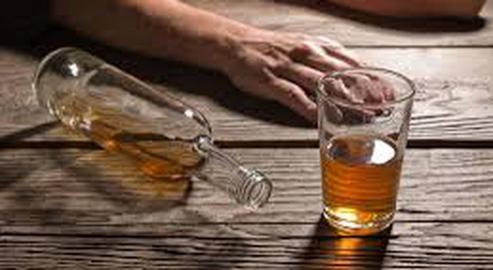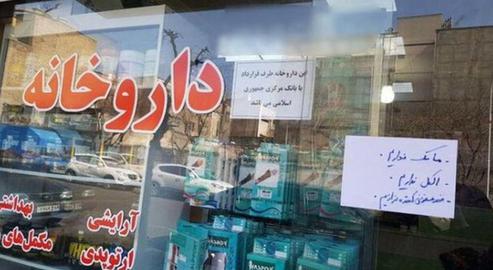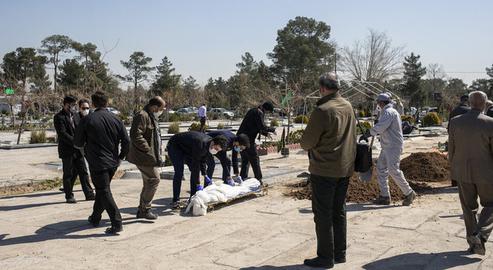The number of victims of counterfeit alcohol (methanol) use in Khuzestan province has reached 46 since the coronavirus outbreak. The victims had consumed the counterfeit alcohol after hearing rumors that it could prevent coronavirus. Now in Khuzestan the victims of alcohol poisoning has surpassed the number of coronavirus victims.
The city of Ahvaz saw the most methanol-related deaths in Khuzestan. On the evening of 9 March, the first victimis of poisoning arrived at Imam Khomeini Hospital but did not survive long enough to see the next day.
The day after, the deaths of two others in Ramhormoz, just 98 kilometers from Ahvaz, added to the casualties. Counterfeit alcohol deaths then increased rapidly – from seven to 16 and a few hours later to 20 people. Thirty-six were dead by the following day and at the timing of writing there were 46 methanol-related deaths.
Ali Biranvand, Ahvaz's deputy prosecutor, told the Islamic Republic News Agency (IRNA) that some Ahvazi citizens have started consuming dangerous counterfeit alcohol which led to their deaths.
In Iran, the sale and consumption of alcoholic beverages is illegal. People sometimes buy white alcohol, ethanol alcohol, or industrial alcohol to consume.
"Consuming pure white alcohol without an additive is not fatal, though it can be harmful for the liver and stomach. But industrial alcohol or methanol is fatal," a doctor says. "Those people who died of counterfeit alcohol poisoning in the past few days have been consuming industrial alcohol or methanol."
Industrial alcohol is not edible, as described by Ashraf Darban, chemist and food industry specialist. The substance is extremely harmful to the skin and digestive system: "Methanol and ethanol create very different reactions. Methanol alcohol intoxication is painful. Symptoms of severe nausea, heartache, palpitations, restlessness, low levels of consciousness, lethargy, and drowsiness that gradually lead to vision impairment and even blindness, and death, are the symptoms of this type of alcohol consumption."
Darban said methanol is quickly distributed through the body after oral or skin contact and reaches the "vitreous" or translucent material behind the eyelids or spinal fluid, after which the process of kidney and liver destruction begins.
When asked why some had gone blind or died, while others claim to have suffered no harm by consuming the substance, Darban said: "The amount of damage ... has a direct relationship to a person's body and is not always the same. Some die by consuming 10 millilitres of methanol alcohol or suffer serious brain and nerve damage, and others may not die and survive even by consuming 10 times that amount. ... If we get the poisoned person to the hospital even minutes earlier, we may save his life or one of the organs involved."
Medical experts recommend visiting a hospital as soon as the first symptoms of alcohol poisoning appear. But the Khuzestan deputy prosecutor said that, due to religious orders and the legal ban on the use of alcohol in the country, consumers and people involved in the preparation and distribution of alcohol will be prosecuted.
Such comments seem to make some young people, involved in industrial alcohol poisoning, stay away from hospitals to the detriment of their lives for fear of being arrested or prosecuted.
A general practitioner in Ahwaz, speaking to IranWire, recommended visiting the hospital immediately if a person is using methanol.
Most of the time, he said, hospital staff keep patients’ identities confidential and report alcohol poisoning cases to the police only if the patient dies. Therefore, people who experience the symptoms of poisoning should visit hospital without fear of consequences and trust the discretion of medical professionals.
”We usually use different methods to reverse the process of poisoning,” the GP said, “including feeding ethanol alcohol or injecting fomepizole, which controls dehydrogenase. If the patient is in a worse condition, hemodialysis for purifying the blood, that has become saturated with lactate and has caused kidney failure. Alcohol poisoning can't be cured by forcing yourself to vomit, and every minute that goes by, it can be harder to save [a patient].”
The GP, who wished to remain anonymous, said that at dawn on 10 March, a case of alcohol intoxication was transferred to his hospital. He said: “He was about 32 years old, moderate height, with signs of nausea and abnormalities in his hair and with severe abdominal pain. He was taken to the emergency department. When I examined him, he had died. His body was cold, and he seemed to have struggled in the last moments of life. I talked to his family and said methanol alcohol poisoning usually occurs after seven to 24 hours. I asked why they had not understood their son’s dangerous condition. After consuming alcohol, it seemed he left his friend's home in a state of euphoria and headed for his own home. At 410am, he called his brother and tried to make him aware of the situation, but he was dead before his family members could reach him. They brought his lifeless body here, we tried to resuscitate him despite the fact that he had no pulse and his body was completely cold. Unfortunately he was lost.”
Legal issues have also left counterfeit alcohol victims helpless during for years.
"As long as the justice system does not change its method of dealing with alcohol consumers, we will witness these deaths," said Shervin Soltanzadeh, an Iranian attorney, who stressed the need to change and retract the laws on alcohol consumption. "There should be legal conditions so that the user will not be afraid to refer to legal authorities. In the alcoholic drinks' market and under the umbrella of banning this trade in Iran, illegal and outrageous transactions and sometimes horrific fraud occurs. This market is driven by specific groups, and users will neither pursue their rights nor or sellers answer for their actions before the authorities. The law not only does not protect the consumer but it says the consumer deserves flogging for drinking alcoholic beverages."
Pursuant to Article 702 of the Islamic Penal Code, buyers and sellers of alcohol are sentenced to six months to a year in prison and 74 lashes. And consumers of alcohol, if they confess or if there is evidence, are convicted and sentenced to 80 lashes.
Behrouz Kalani, a major distributor of disinfectant products in Khuzestan, who also works with industrial alcohol distributors, describes the conversion of methanol, which naturally has a yellow color, to apparently edible alcohol, a product which these days has led to the death of many citizens.
”I heard from a friend of mine that these people were poisoned with methanol which was mixed with bleach,” Kalani said. “Drop some bleach into industrial alcohol to discolor it. The combination of these two substances is extremely dangerous. How can one person do this for profit? In my opinion, this is a kind of mental illness. Because this person cannot say he had unknowingly bought methanol and wood alcohol and had poured it into different cans and even packaged them and offered them to a poor customer. I think all of these steps require a great deal of precision and cannot be done unknowingly."
A few days ago, a video was posted on social media showing that adding a few drops of bleach to methanol changes the yellow color to white, similar to ethanol alcohol.
In the past three days, in addition to the dead in Khuzestan province, five people died in Alborz province due to alcohol poisoning. According to Elham Farhadi, the head of Saveh's Modares Hospital, recently a woman who had come to the hospital for alcohol poisoning has died along with her male partner.
Were the victims of this painful death aware of what they were doing or aware of the danger that could be threatening them?
M. Tousheh is one of them. He lost his sight six years ago while using industrial alcohol. In response to the above question, he said: "I am willing to give up all the assets of my life to go back to the time before this incident. I had heard about the dangers of this process, but I always thought it couldn't hurt me. I was strong, with muscles and a healthy body. But I kept doing it until [poisoning] finally happened."
M. Tousheh felt dizzy and intoxicated for several hours after drinking alcohol, and kept going to the bathroom. "It was about six hours after I fell asleep that I woke with abdominal pain and in a cold sweat. But I didn't get it seriously. I thought that because I had been drinking a lot of alcohol with on empty stomach, my stomach was reacting. But the headache and dizziness, along with blurred vision, made me think that this was something unusual. I threw myself into the yard and started screaming. On the other side of the yard, my brother and his wife, who had just got married, lived and I fell to the ground. This time the pain in my stomach was worse and I could hardly breathe. I was trying to breathe through my mouth but alcohol and bile came up and blocked my breathing." A few days later M. Tousheh realized that he had been blinded forever.


























comments